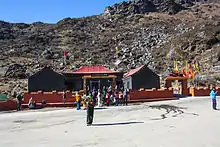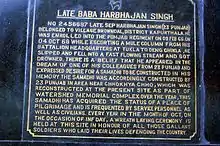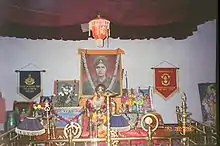Baba Harbhajan Singh
Captain "Baba" Harbhajan Singh (30 August 1946 – 04 October 1968)[1] was an Indian army soldier. Service period: 30 June 1965 - 1 December 2019(Posthumous retirement)

He is revered as the "Hero of Nathula" by soldiers of the Indian army, who built a shrine in his honor. He was accorded the state of the saint by believers who refer to him as the "Baba" (saintly father). Many of his faithful - chiefly Indian army personnel posted in and around the Nathu La and the Sino-Indian border between the state of Sikkim and Tibet Autonomous Region - have come to believe his spirit protects every soldier in the inhospitable high-altitude terrain of the Eastern Himalayas. As with most saints, Baba is believed to grant favors to those who revere and worship him. He is said to be protecting the country even after death.
Life and military career
Baba Harbhajan Singh was born into a Sikh family on 30 August 1946 in the village of Sadrana (now in Pakistan). He completed his preliminary education at a village school, and then matriculated from DAV High School in Patti, Punjab, in March 1965. He enlisted as a soldier in Amritsar and joined the Punjab Regiment(India).[2]
Death and associated legend
He was martyred in 1968 near the Nathu La in eastern Sikkim, India. Harbhajan Singh's early death at the age of 22 is the subject of legend and religious veneration that has become popular among Indian Army regulars (jawans), the people of his village and apparently soldiers of the Chinese People's Liberation Army (PLA) across the border guarding the Indo-Chinese border between Sikkim and Tibet.[3]
The official version of his death is that he was a martyr of battle at the 14,500 feet (4,400 m) Nathu La, a mountain pass between Tibet and Sikkim where many battles took place between the Indian Army and the PLA during the 1965 Sino-Indian war.[4]

According to legend, Singh drowned in a glacier while leading a column of mules carrying supplies to a remote outpost. His remains were found after a three-day search. His body was subsequently cremated with full military honors. The legend further claims that the late Singh helped the search party find his own body. Many Indian soldiers have revealed that in the event of a war between India and China, Baba would warn the Indian soldiers of an impending attack at least three days in advance. During flag meetings between the two nations at Nathu La, the Indians as well as the Chinese set a chair aside to honor him.
As per common belief, any army official not maintaining a clean and disciplined attire is punished with a slap by Baba himself. His own attire which hangs in the display need not be cleaned by anyone as it gets cleaned by his own soul.
Legacy

He has come to be known as "Saint Baba".[5] Every year on 11 September, a jeep departs with his personal belongings to the nearest railway station, New Jalpaiguri, from where it is then sent by train to the village of Kuka, in the Kapurthala district of the Indian state of Punjab. While empty berths on any train of the Indian Railways are invariably allocated to any waitlisted passenger or on a first-come-first-served basis by the coach attendants, a special reservation for the Baba is made. Every year a seat is left empty for the journey to his hometown and three soldiers accompany the Baba to his home. A small sum of money is contributed by soldiers posted in Nathula to be sent to his mother each month and his village still remembers him as martyr and undertook the initiative to help his family .[6][7]
References
- "Baba Harbhajan temple Sikkim History In Hindi: बाबा जशवंत सिंह मंदिर - सिक्किम - इस मृत सैनिक की आत्मा आज भी करती है देश की रक्षा". ajabgjab.com. 2 June 2014. Retrieved 15 January 2017.
- https://www.honourpoint.in/profile/sepoy-baba-harbhajan-singh/
- "The Hero Of Nathula Pass – Spirit Of Baba Harbhajan Singh That Guards India's Border". indiatimes.com. Retrieved 24 July 2017.
- http://gallantryawards.gov.in/awardees/maha-vir-chakra
- "Baba Harbhajan Singh: A Dead Soldier still on duty". youtube.com. 4 July 2015. Retrieved 15 January 2017.
- "The soul sentinel".
- "Harbhajan Singh of Upper Sikkim". Archived from the original on 7 August 2006.